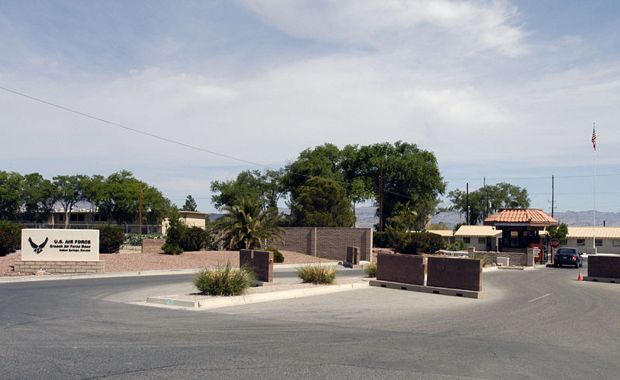
The unmanned drones being used against targets in Pakistan today are controlled from Creech Air Force Base in Nevada (above), about fifty miles from Nellis Air Force Base — just north of Las Vegas, where I live. This is very surreal, but is it also immoral? Paul Zahl offers some thoughts on the subject:
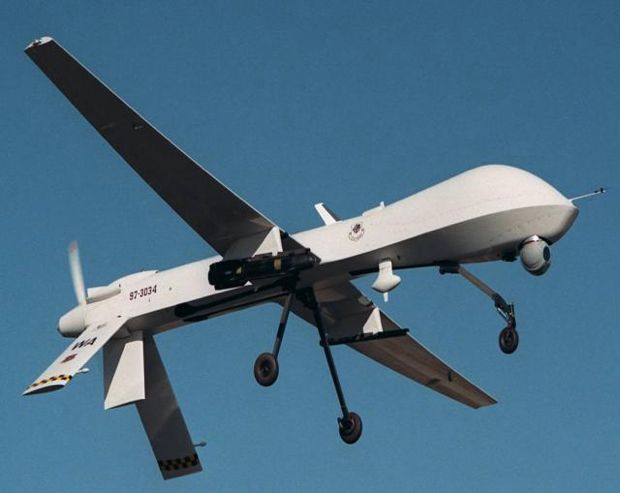
IS ANYBODY OUT THERE?
Does anyone care about the morality of unmanned drones? These are unmanned aircraft, mostly controlled from bases in the USA, which are able to kill people from great heights, and with considerable precision.
Drones exist at the extreme end of mediated combat, in that the sole combatant (i.e., the actual pilot of the plane) sits thousands of miles away from the operation, in front of a computer screen. Talk about the “personal” aspect being removed from the conduct of war. Well, here 'tis! Not a single casualty possible, on our side.
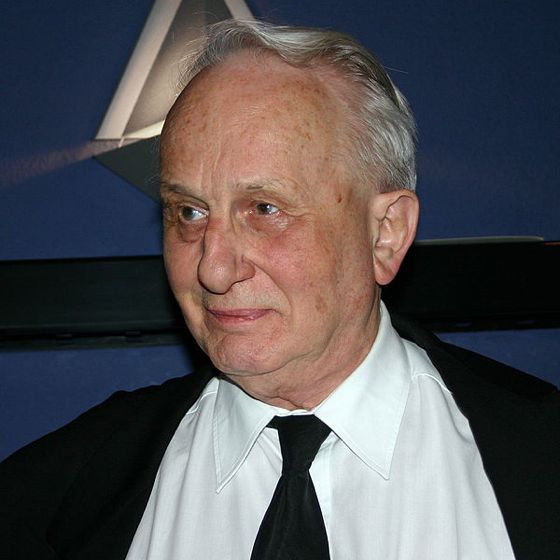
In 1965 the Swiss playwright Rolf Hochhuth [above] had a play produced in Germany entitled Soldiers (Soldaten). It was a long and talky evening, in which the pros and cons of a tactic used by British Bomber Command during World War II were discussed in the setting of a drama involving Winston Churchill and members of his staff.
Halfway through this play of ideas, which concerned the ethics of “carpet bombing” of German cities by the RAF, came a confrontation that introduced the Eternal. Bishop George Bell made an entrance.
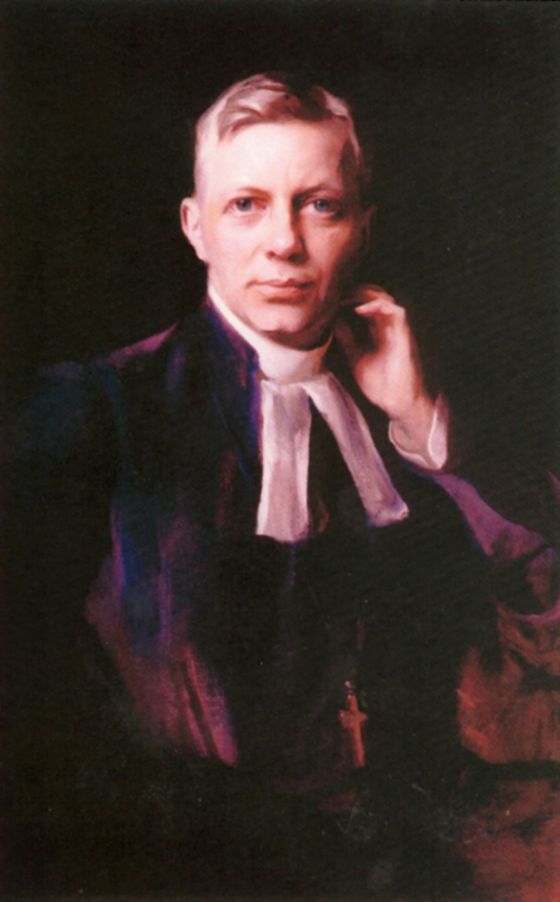
George K. A. Bell [above] was Bishop of Chichester in the Church of England during the Second World War. In
a now almost canonized but then extremely unpopular speech in the House
of Lords, Bell challenged the Government on its bombing policy. In the play Soldiers Hochhuth imagines a personal meeting between Winston Churchill and Bishop Bell, in which they debate the morality of bombing from the air, especially when there is the possibility, even the probability, of civilian deaths.
Churchill believed that the bombing of civilian centers was essential to the Allies' winning the war. Bell believed it was a war crime.
a now almost canonized but then extremely unpopular speech in the House
of Lords, Bell challenged the Government on its bombing policy. In the play Soldiers Hochhuth imagines a personal meeting between Winston Churchill and Bishop Bell, in which they debate the morality of bombing from the air, especially when there is the possibility, even the probability, of civilian deaths.
Churchill believed that the bombing of civilian centers was essential to the Allies' winning the war. Bell believed it was a war crime.
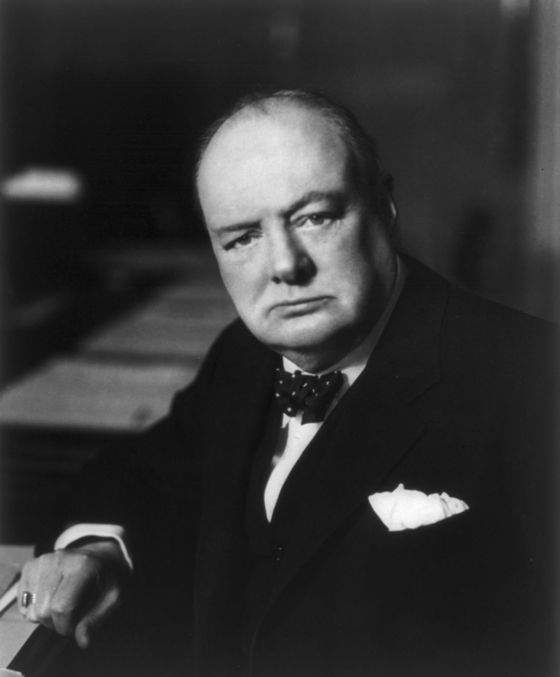
Soldiers takes its third act to envisage a confrontation between the two men. While this meeting never actually occurred, the artist conveys an emotional truth: the short-term victory of Power in all things in relation to the long-term victory of Mercy in all things.
Here are a few lines that the playwright puts in the mouth of Bishop Bell. They are mostly lifted from Bell's speeches and writings, or deduced from them:
Here are a few lines that the playwright puts in the mouth of Bishop Bell. They are mostly lifted from Bell's speeches and writings, or deduced from them:
“. . . our fury is unworthy. Are not these actions a betrayal of the ideals that impelled us all?”
Stage Direction:
“BELL, by his quiet strength, has released something akin to shame in CHURCHILL. This cannot be indicated logically, only portrayed illogically. The feeling does not last. The PRIME MINISTER is discomposed for a moment by the knowledge that someone is stronger than he is.”
“The targets change — but what will stay the same is . . . [t]he killing of the defenseless from the air.”
“Save what an Englishwoman brought into being, take your stand by the legacy of Florence Nightingale.”
Final Stage Direction:
“BELL turns away, he is forced to, overcome by despair . . . his voice fades like that of mankind in the tumult of the massacre of history.”
Bishop Bell's unpopular protest against the bombing was unanimously rejected by the Government. He lost all chance of being “preferred”, as Church parlance puts it, to higher office. He lost all chance, period. Now George
Bell is a saint, in memory, of the Church of England. Then, he was a
pariah. Dresden was still bombed. The Atom Bomb was dropped, twice. [Below, the aftermath of Dresden:]
Bell is a saint, in memory, of the Church of England. Then, he was a
pariah. Dresden was still bombed. The Atom Bomb was dropped, twice. [Below, the aftermath of Dresden:]
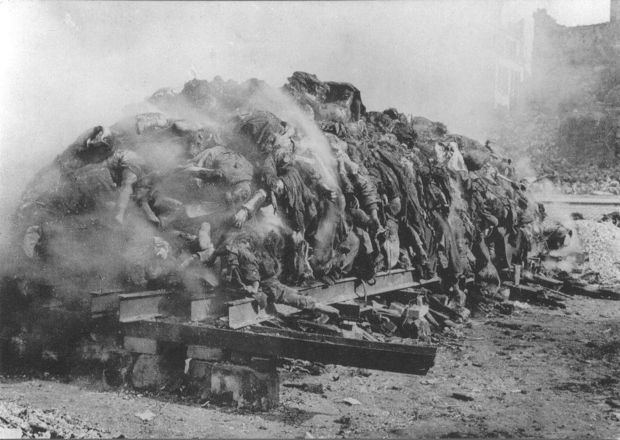
What about our doings out in the Nevada desert? What about the kind of impersonal warfare that Lindbergh warned the world about? What
about combatants who cannot see, for a distance not of 30,000 feet,
but of 10,000 miles, the enemy, let alone the enemy's family, who are
burned in an instant to a cinder?
What would the hero of Hochhuth's Soldiers think about what we are doing today?
about combatants who cannot see, for a distance not of 30,000 feet,
but of 10,000 miles, the enemy, let alone the enemy's family, who are
burned in an instant to a cinder?
What would the hero of Hochhuth's Soldiers think about what we are doing today?
I'm glad Bishop Bell is dead. For his sake.

We need a facebook or social media page for this. Mainstream media and ordinary oblivious folks think that a drone is a remote control web cam, A TOY.
The more awareness we bring to this atrocity, the better – in solidarity.